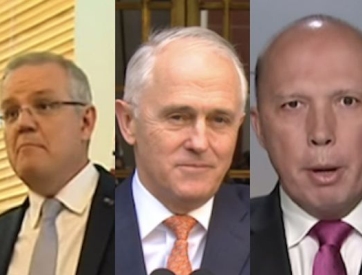Politicians are increasingly betraying the public interest by representing vested interests rather than their constituents. John Menadue says it is damaging our democracy.
OUR POLITICIANS disgrace themselves and us.
Former Trade Minister Andrew Robb walked out of the Cabinet and Parliament after negotiating the China-Australia Free Trade Agreement and into a $880,000-a-year job with a Chinese billionaire who has a 99-year-lease on the Port of Darwin. This followed a string of earlier ministers who took advantage of their ministerial experience to profit from lobbying. In earlier days, Peter Reith, a former Defence Minister, took a job with TENIX, a defence logistics firm. Fellow Howard Government ministers Alexander Downer, Nick Minchin, Mark Vaile, Michael Wooldridge, Helen Coonan, Richard Alston, Santo Santoro, Larry Anthony and Peter Costello also all went to work as lobbyists. These days, Mark Arbib lobbies for Crown and Martin Ferguson lobbies for the resource and energy sector. Stephen Conroy joined the misnamed James Packer backed ‘Responsible Wagering Association’ and Helen Coonan joined Crown.
There has been a revolving door between former Department of Defence officials and arms suppliers. The former head of Defence and Prime Minister and Cabinet Dr Ian Watt was appointed non-executive chairman of BAE Systems Australia, which is a major supplier to the Australian Defence Forces. Dennis Richardson, the former secretary of the Department of Defence, told the Senate Estimates Committee in October 2015 that the relationship between Department of Defence and the arms industry is vulnerable to ethical breakdown because of the steady flow of staff between the two. He added that the specialist knowledge involved in defence procurement, which costs billions of taxpayer dollars a year, means that there is a heavy exchange of staff between defence and the industry which supplies it.
George Brandis thinks it's "appropriate & commonplace" for Gov MPs to receive money to lobby the Government #auspol https://t.co/IE6EpN5YDV
— Jacqui Lambie (@JacquiLambie) October 24, 2017
Sean Costello, a former senior adviser to Defence Minister David Johnstone, resigned and then took the position of CEO with the French company DCNS Australia which subsequently won the 50 billion dollar submarine contract.
I have written about the way the US-led military, armaments and intelligence complex have effectively taken over Australia’s foreign policy. The Australian Department of Foreign Affairs and Trade is largely ignored and the U.S. military industrial complex, which has seduced our Department of Defence, really calls the shots. The hidden "security state" is growing daily in power. It cannot be trusted to act in Australia’s interest. It is corrupting our public life and endangering our safety.
British and American arms suppliers, like Northrop Grumman and BAE Systems, make substantial funding contributions to our “independent” thinktank, the Australian Strategic Policy Institute. which advises the Australian Government on defence policy . Weapons suppliers like Lockheed Martin are now also funding the Australian War Memorial. How can we trust institutions like ASPI and the AWM that take money from extremely powerful foreign weapons manufactures whose prosperity depends on never ending wars which the U.S. has pursued in almost its entire history.
And it is not just the weapons industry that engenders mistrust. Many "independent" think tanks like IPA and Sydney Institute are funded in secret by powerful vested interests. Yet the ABC and other outlets allow people from these compromised organizations to appear in their media.
In their book Game of Mates, Professor Paul Frijters and Dr Cameron Murray wrote about how Australian business people make their money. They drew attention to ways developers in Brisbane influenced the zoning system in their favour by suborning politicians and senior public servants.
Professor Frijters and Associate Professor Gigi Foster also examined our 'BRW Rich 200 list'.
'Over 80 per cent of the wealthiest Australians have made their fortunes in property, mining, banking, superannuation and finance generally – all heavily regulated industries in which fortunes can be made by getting favourable property rezoning’s, planning law exemptions, mining concessions, labour law exemptions, money-creation powers and mandated markets of many stripes.'
In 2015, two U.S. economists, Associate Professor Sutirtha Bagchi and Jan Švejnar, used the international 'Forbes Rich List' to estimate the proportion of billionaires in 22 countries who owed their wealth to political favours. Australia ranked third worst in the world and only slightly better than Columbia and India. In Australia, political connections and lobbying count for much more than entrepreneurial or business skills. We have a crony capitalist society, which abuses trust and in which business people incessantly lobby government and politicians to rig the market in their favour. In the guise of "getting rid of red tape", important safety and consumer protections are removed or not enforced .
Political lobbyists are having a field day in Australia. At my last count, there were over 900 full-time independent lobbyists working in Canberra. That is over 30 for every cabinet minister. On top of these “third party” lobbyists, there are the special interests who conduct their own lobbying: such as the Minerals Council of Australia and the Australian Pharmacy Guild. These lobbyists promote a whole range of interests (including mining, clubs, hospitals, private health insurance funds, businesses and hotels) that have all successfully challenged government policy and the public interest. Just think what the Minerals Council did to subvert the mining tax and Clubs Australia to thwart gambling reform. There is a lobbying swamp in Canberra that badly needs draining. These secret but powerful lobbyists are doing enormous damage to public trust.
GVK Wedding: Barnaby Joyce & Gina Rinehart at the wedding: Joyce claimed... Why Adani exists #auspol https://t.co/OIAbXq4Tmp via @YouTube
— Phantomime (@Biggy1883) November 1, 2017
The wealthy polluters, together with their political and media allies, successfully destroyed the Emissions Trading Scheme. A decade later, we still do not have a power generation system that reduces pollution and ensures reliable supply
And then there are the banks.
As Ian McAuley has put it:
'Somehow we have allowed the finance sector – banks, life-insurers, general insurers, health insurance and brokers – to morph from a service function supporting the real economy to the status of a major industry in its own right.'
They are a bloated overhead.
As Paul Volcker put it in 2009: the only useful innovation banks have come up with in the last 20 years is the ATM. The banking sector has grown enormously, while contributing little of real value to the community. Add to this the unethical behaviour, enormous profits and greedy CEO salaries in the sector and it is no surprise we have lost trust in the banks. That loss of faith has not been helped by senior Treasury officers leaving the public service to join our large bloated banks.
But the greatest corruptor of public trust in Australia and also in UK and U.S. is the Murdoch Media. It seeks to discredit almost all government action, except when government intervention is in its favour. Think media licence fees. Government favours have been critical in building the Murdoch machine. Yet this organisation chooses deliberately to discredit the whole public and political process, which provides so many essential public services. It ruthlessly attacks politicians unless they are acting for the benefit of Murdoch. Government intervention is good when it is to the benefit of Murdoch, but not otherwise.
Mitch Fifield refuses to explain Foxtel cufflinks gift days after media reform bill passes Senate https://t.co/ma3A6mUrBZ via @abcnews
— Gillian Bradford (@bradders2) October 9, 2017
Increasingly, young people are asking why they should trust the older generation and their corrupted institutions. Jeremy Corbyn tapped into their dissatisfaction. The older generation shows little concern for the decay of our planet and the aspirations of the young to own a home of their own. Our politicians are not game to tackle the power of institutions like the Property Council, that wants to keep property prices high at the expense of young non property owners..
The failure of our major institutions – and particularly our political parties – has made many people turn to NGOs like GetUp! to express their concerns and press for change. In response, the privileged now seek to curb those NGOs — even raiding trade union offices.
We need a whole range of institutional reforms to win back the trust of the community, particularly the young. We need to close the revolving door that allows politicians, senior public servants and even former prime ministers to take lucrative jobs on retirement in the private sector. Isn’t their pension enough? None should be allowed to work for three years with firms they have had dealings with as ministers or senior officials. We clearly need to draw stricter rules for lobbyists and make their activities transparent and public. We need a Federal ICAC and major political donations reform. We urgently need a public inquiry into the role of Parliament and how it can be made an effective deliberative body again. Recently, the late Ian Marsh strongly presented the case for parliamentary reform and how it could be done. We need renewal of our political parties so that they reflect their voter support rather than a small group of factional overlords.
The UK election showed that genuine, honest and sincere leaders can encourage people, particularly the young, to ignore fear and division engendered by vested interests and the right wing media. Young people know that their trust has been abused and hitherto had decided to opt out from leaders they don't trust. They rejected the bankrupt policies and leaders of the past and embraced Jeremy Corbyn.
Jeremy Corbyn in Southport: There are going to be powerful vested interests that attack 'what we are trying to do'. They already are. pic.twitter.com/BOMMCvNPo7
— Corbynator (@Corbynator2) August 18, 2017
Trust, once lost, is hard to regain. It is a pervasive problem in Australian public life today, and no group is less trusting than the young and understandably so.
Can that mistrust be galvanised to build a more vibrant and caring Australia and save the planet for future generations?
This article was originally published on John Menadue's blog 'Pearls and Irritations'. John Menadue is a commentator, businessman and former diplomat. You can follow John on Twitter @johnmenadue.

This work is licensed under a Creative Commons Attribution-NonCommercial-NoDerivs 3.0 Australia License
Monthly Donation
Single Donation
Tony Burke asks Malcolm Turnbull about investigation into Bruce Billson lobbying https://t.co/9nYOhyMTHp
— patrick o'rourke (@Pat1066Patrick) October 17, 2017
Keep up! Subscribe to IA for just $5.











